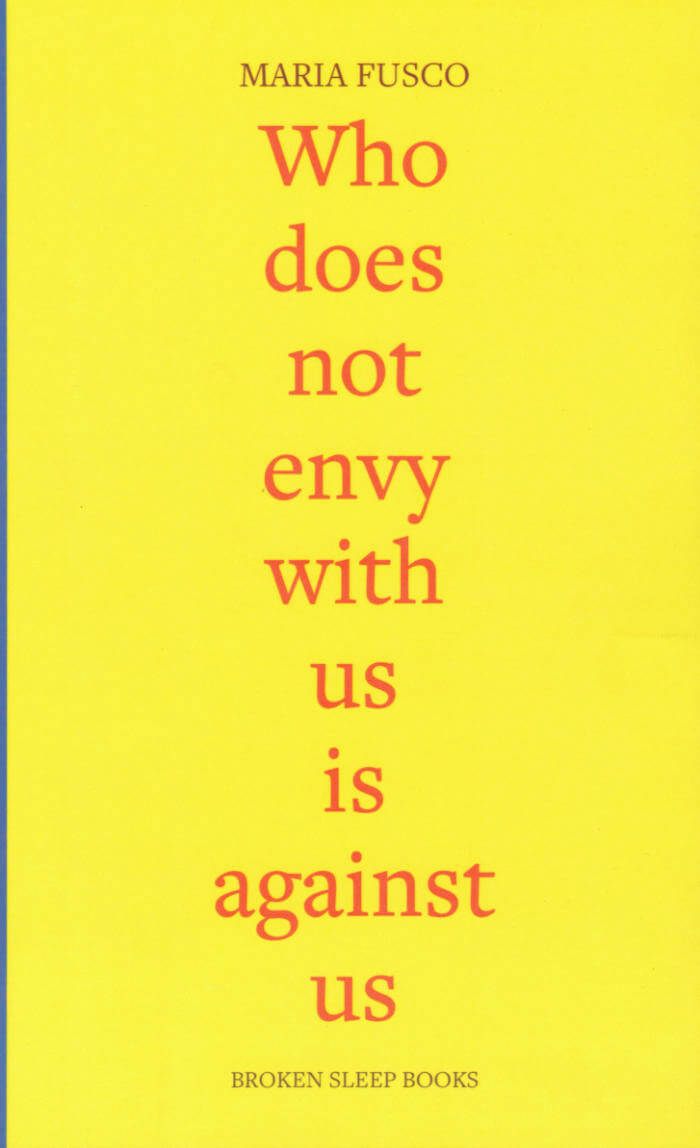Maria Fusco
Maria Fusco

Who does not envy with us is against us: three essays on being working-class
Who does not envy with us is against us is a collection of essays on working-classness that demonstrates Maria Fusco's exceptional talent for weaving together the analytical and the poetic to create an affecting and profound work.
With expressive prose, Fusco deftly captures the experiences of the global working class, illuminating emotions that unite them across borders and lines. This is a tribute to the resilience and tenacity of working-class communities, and an invitation to readers to join in a deeper understanding of their struggles and triumphs. Through her masterful storytelling, Fusco utilises the power of language to elevate the voices of those who have long been silenced, creating a symphony of words that will echo long after the final page.
"I love this book with my entire life and beyond. Fact that I grew up a thousand miles south of Belfast, but, days after reading, feel like I'm - or should be - from there is testament to Fusco's analytic and lyric genius, and her ability to move and affect. Fusco mobilises a previously unnamed mood shared by the international, intergalactic working classes, I've never seen anything like it. Read this book." - Isabel Waidner, Corey Fah Does Social Mobility

Master Rock
Master Rock is a repertoire for a mountain.
Rough land, open palm. Bodies are machines that shake. Big boned faces, big hands, big claws, ah Jesus, well-used. Bore. Blast. Smash. Force on loan. Must be hard and clever to survive in this technological age. Granite knows the biological. Gods inside the mountain, just plain men outside.
Working through the cavernous space in Ben Cruachan, the largest peak on the west coast of Scotland, Maria Fusco exhumes three fictional voices from fact: Tunnel tigers, the Irish explosives experts who emptied out the mountain to build a power station; Elizabeth Falconer, the artist who produced a mural inside that only the site’s workers ever see; and Granite, the 450 million year-old rock of Cruachan itself as a main character.
And more

Enn Gramaten
Luke Williams, Natasha Soobramanien
A cautionary tale of academic privilege and misadventure in Diego Garcia via a Kreole translation, and parallel live chat.
Dialecty, conceived by Maria Fusco with The Common Guild, considers the uses of vernacular forms of speech and writing, exploring how dialect words, grammar and syntax challenge and improve traditional orthodoxies of critical writing.

Thresholds: A Prosody of Citizenship
‘In De vulgare eloquentia, Dante developed a poetics of the vernacular – the collectively accessible speech of the household and the street, distributed unilaterally rather than intentionally acquired via a disciplined pedagogy of grammar, and transformed in open bodily exchange, irrespective of social position, gender or rank. “The vernacular,” Dante says, “[is] the language which children gather from those around them when they first begin to articulate words; or more briefly, that which we learn without any rules at all by imitating our nurses.” A vernacular is not structured according to a valuing hierarchy or an administration of history; it is improvised in tandem with the rhythmic needs and movements of a present-tense yet tradition-informed body among other bodies, each specific. There is no general vernacular; it is intrinsically grammarless. Vernacular speech can only ever begin and can never achieve closure. Refusing spatial propriety, it crisscrosses institutions. In Dante’s definition, it is what’s spoken by women and children, thus it is the first, and natural language: “The whole world uses it through its diverse pronunciations and forms”.’ – from Thresholds: A Prosody of Citizenship.
Lisa Robertson’s reflection of political subject formation, through poetry and vernacular forms, acts as a critical anchor for the ideas and experiments published in this new series, Dialecty.
Dialecty, conceived by Maria Fusco with The Common Guild, considers the uses of vernacular forms of speech and writing, exploring how dialect words, grammar and syntax challenge and improve traditional orthodoxies of critical writing.

Silver Bandage
The Happy Hypocrite – Silver Bandage gathers together new kinds of writing about ‘vibes’, those often unspoken energies of desire and aversion that move between people, palpable but traceless, hard to prove. The messages sent by your gut that you can’t always interpret, beyond an urge. What is intangible – vibes, feelings and reflexive responses like blushes, fidgets, slumps in posture, fluctuations in voice – is now targeted by invasive technologies of affective measurement. How can writing resist this regime of quantification?
With an introduction by Maria Fusco, contributions and new work by CAConrad, Mel Y. Chen, Adam Gallagher, Alexandrina Hemsley, Rebecca Jagoe, Jessa Mockridge, Natasha Papadopoulou, Naomi Pearce, Parsa Sanjana Sajid, Patrick Staff, Daniella Valz Gen, and Hypatia Vourloumis. This issue’s archive is dedicated to Katerina Gogou.
Erica Scourti is an artist and writer, born in Athens and now based mostly in London, whose work explores biographical writing and bodily inscription in the performance of subjectivity. Her writing has been published in Spells, Ignota (2018) and Fiction as Method, Sternberg (2017), among others.